Recommended Fall-Planted, Spring-Flowering Bulbs
go.ncsu.edu/readext?487919
en Español / em Português
El inglés es el idioma de control de esta página. En la medida en que haya algún conflicto entre la traducción al inglés y la traducción, el inglés prevalece.
Al hacer clic en el enlace de traducción se activa un servicio de traducción gratuito para convertir la página al español. Al igual que con cualquier traducción por Internet, la conversión no es sensible al contexto y puede que no traduzca el texto en su significado original. NC State Extension no garantiza la exactitud del texto traducido. Por favor, tenga en cuenta que algunas aplicaciones y/o servicios pueden no funcionar como se espera cuando se traducen.
Português
Inglês é o idioma de controle desta página. Na medida que haja algum conflito entre o texto original em Inglês e a tradução, o Inglês prevalece.
Ao clicar no link de tradução, um serviço gratuito de tradução será ativado para converter a página para o Português. Como em qualquer tradução pela internet, a conversão não é sensivel ao contexto e pode não ocorrer a tradução para o significado orginal. O serviço de Extensão da Carolina do Norte (NC State Extension) não garante a exatidão do texto traduzido. Por favor, observe que algumas funções ou serviços podem não funcionar como esperado após a tradução.
English
English is the controlling language of this page. To the extent there is any conflict between the English text and the translation, English controls.
Clicking on the translation link activates a free translation service to convert the page to Spanish. As with any Internet translation, the conversion is not context-sensitive and may not translate the text to its original meaning. NC State Extension does not guarantee the accuracy of the translated text. Please note that some applications and/or services may not function as expected when translated.
Collapse ▲Original post by Charlotte Glen, Update by Matt Jones
Chatham County’s Extension Master GardenerSM volunteers recommend the following bulb varieties for naturalizing in local landscapes. Bulbs that naturalize are perennials that return and multiply year after year, making them a good investment of your planting time and landscape budget. Order these bulbs during our Fall Bulb Sale!
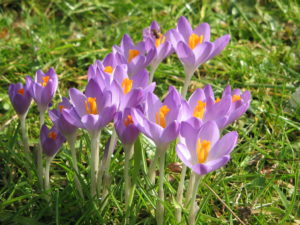
Crocus tommasinianus – Tommies
Tommies are a squirrel resistant species of Crocus that is longer lived than most spring blooming crocus. They bloom from 3” to 6” tall so can be planted in your lawn since they bloom before grass cutting begins. A couple of favorite varieties are ‘Barr’s Purple’ and ‘Ruby Giant’.
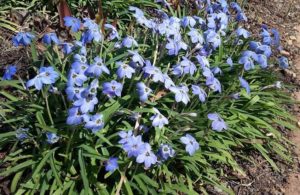
Iphieon uniflorum – Star Flower
Star Flower is another short, spring bloomer that can be planted in the lawn. They are rarely bothered by deer or squirrels. ‘Jesse’ is a recommended deep blue variety, pictured above. ‘Tessa’ is a pollinator attractor with pink flowers and sweet fragrance.
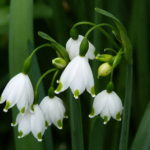
Leucojum aestivum – Snowflake
With its green-tipped, white lily of the valley shaped blossoms, Snowflake is a lovely companion to late blooming varieties of yellow daffodils. One of the few bulbs that tolerates moist soil and less than perfect drainage. Deer resistant.
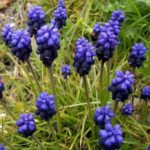
Muscari neglectum – Blue Bottles, Grape Hyacinth
Muscari neglectum is a short sweet smelling grape hyacinth species recommended for southern gardens. It bears dark purple blooms with white rims. Muscari neglectum bulbs naturalize but are not deer resistant.
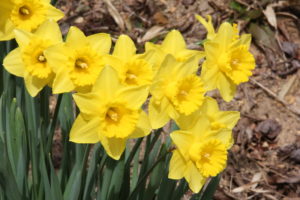
Narcissus – Daffodils
Nothing says spring like daffodils! ‘Saint Keverne’ and ‘Carlton’ are large-flowered yellow varieties recommended for naturalizing. For a splash of yellow in February, try ‘February Gold’ (all yellow) or ‘Jack Snipe’ (yellow cup with white petals) both of which are shorter than later blooming varieties. Also dependable are the varieties sometimes referred to as jonquils, which bear fragrant clusters of small flowers resembling paper whites. Recommended selections include ‘Sweetness’, ‘Minnow’, and ‘Avalanche’. Neither deer nor squirrels are attracted to daffodils.
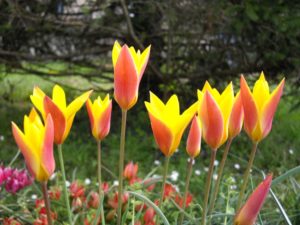
Tulipa clusiana – Lady Tulips
The smaller and shorter species tulips naturalize much better than large-flowered Dutch hybrids. For perennial tulips, try Tulipa clusiana, Lady Tulips. The variety ‘Cynthia’ has red petals edged with chartreuse and is a favorite of our Chatham County Extension Horticulture Agent.
Many other fall-planted bulbs will be stunning next spring, but may not naturalize as well as those listed above.
NOTE: There is no need to purchase precooled bulbs – as long as bulbs are planted by early December, our winter will do the cooling for you!




